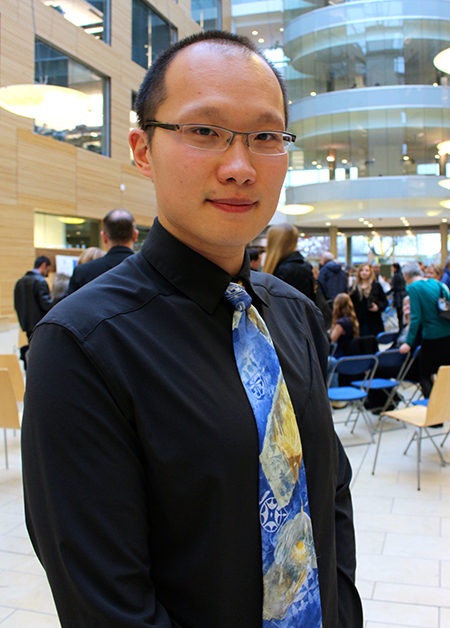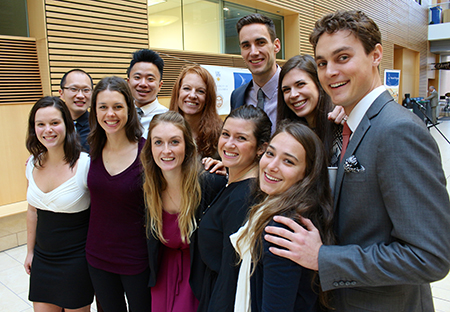
Tiger Ye, one of the Northern and Rural Cohort students, at the Nov. 26 graduation reception for Masters of Physical Therapy students. Photo by Kerry Blackadar
A new group of students earned their degrees at UBC on Nov. 26 — the Northern and Rural Cohort of the Masters of Physical Therapy program.
Created in 2012 with funding from the provincial government to boost recruitment of physical therapists to B.C.’s underserved communities, the cohort did most of their hands-on training far from Vancouver.
The program built upon the concept, the framework, and even the facilities of the Faculty of Medicine’s now decade-old distributed medical education program, which created regional campuses in Prince George, Victoria and Kelowna in a similar effort to guide more young physicians to all parts of the province.
The cohort now comprises 20 of the 80 physical therapy students admitted each year.
Northern and Rural Cohort (NRC) students, in addition to doing four of their six clinical education placements in northern and rural B.C., also received one week of instruction at the Physiotherapy Plinth Lab at the University of Northern British Columbia. (For subsequent cohorts, that instruction expanded to three weeks.) NRC students shared lectures with their Vancouver-based classmates through video-conferencing and practical labs led by local faculty.
Tiger Ye did one of his rotations at South Okanagan General Hospital in Oliver — and that happens to be where he is now working.
“I know the system, I know all the doctors and nurses, so I can jump right in and help,” Ye says.
Before becoming a physical therapy student, Ye, 28, had travelled around B.C. as part of ActNow BC, a provincial health promotion project. But being part of the Northern and Rural Cohort allowed him to see even more of it, including Haida Gwaii, and convinced him that he wanted to work in a rural setting after graduation.
“There aren’t enough practitioners in those communities, so you can really dive in and make the connections,” he says. “You get to interact with the doctors when they’re making a diagnosis, and you get to know the patients.”
Students are selected for the NRC from among the successful applicants to the Masters of Physical Therapy program, based on their grades, interview scores and their rural background and suitability for rural practice. The first NRC was admitted in September 2012, and included four students from northern B.C.

Members of the inaugural Northern and Rural Cohort at the Masters of Physical Therapy graduation reception. Photo by Kerry Blackadar
“The Northern and Rural Cohort, as young as it is, has been enormously successful, as evidenced by the fact that the number of applicants has more than doubled, to 85 students for our 20 slots in 2014, but also by the fact that students in the cohort perform as well as or better than their peers on exams and assignments,” said Gavin Stuart, Dean of the Faculty of Medicine and UBC’s Vice Provost, Health. “Like the distributed medical education program, the cohort showcases our ability to respond to provincial needs with expertise, a collaborative approach and a commitment to doing it right.”
UNBC has served as the academic home of the Northern Medical Program, which educates 128 UBC medical students through a combination of local instruction, videoconferencing with other academic sites in Vancouver, Victoria and Kelowna and clinical placements in the region.
Despite the underlying shortage of physiotherapists in northern and rural areas, the NRC continues to expand its clinical education capacity. In 2014, 206 sites offered to take students, almost double the number in 2012. Also, in the last eight months, 13 preceptors have been trained, some of them in towns that have never hosted physical therapy students, including 100 Mile House, Dawson Creek, Port Alberni and Gold River.
Like Ye, several members of the first cohort are already set to fulfill the promise of the program by taking positions in northern and rural communities. Kaley Strachan is filling a long-running vacancy at Fort St. John Hospital in Vanderhoof, and Curtis Schmidt is doing the same at Port Hardy Hospital.
Carmen Bedard-Gautais will be stringing together several part-time jobs: assisting a UBC research project focused on encouraging physical activity among members of the First Nations Kwakiutl District Council; working in a family-owned physiotherapy clinic in Parksville, where she expects to help the predominantly older population with orthopaedic problems as well as dizziness; and setting up the only physiotherapy practice on Denman Island, where she lives.
“Doing clinical placements in these more remote areas really made me realize how hard it is for people there to get the services they need,” she says.